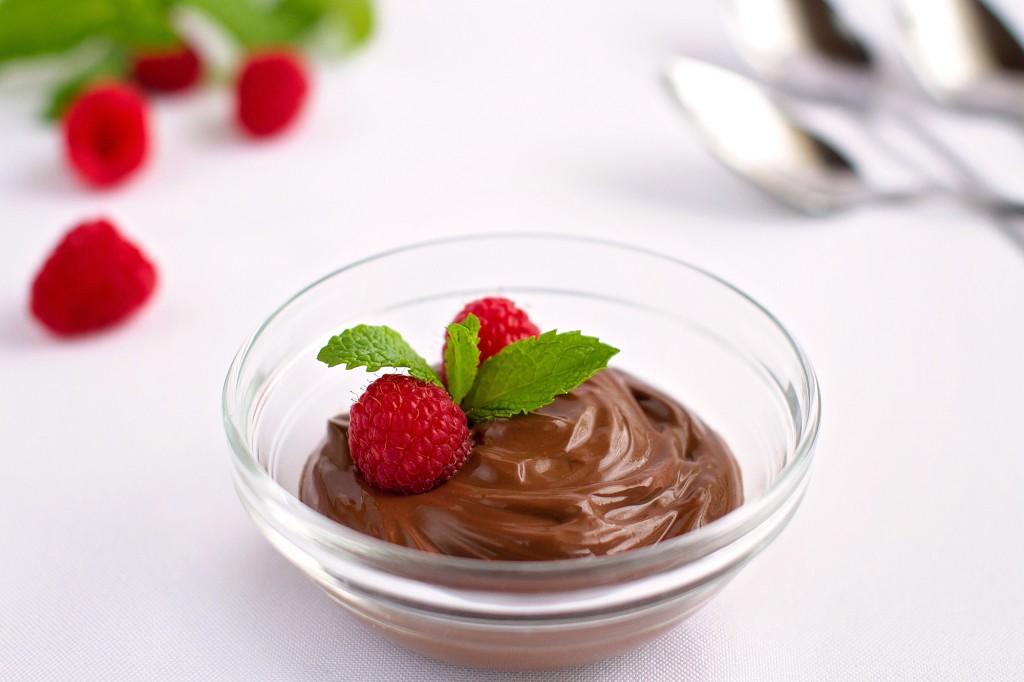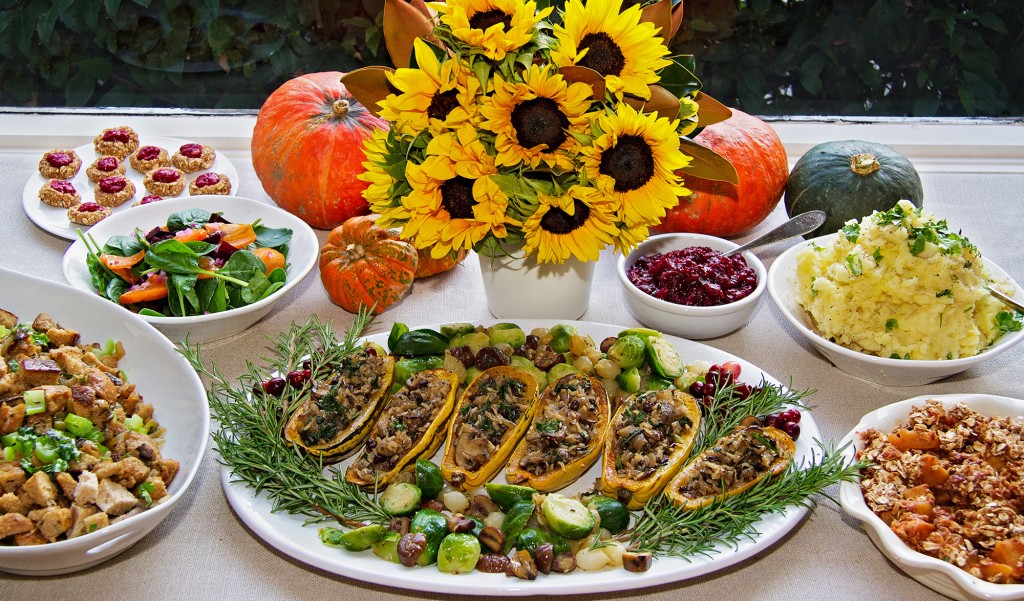
Elevate Your Gratitude with Harvest Produce
Photo Credit: Amanda Mathson
There is something so nourishing and enchanting about fall produce: nutrient-rich, crimson beets; orange Cinderella pumpkins; pearly white cauliflower crowns; evergreen kale and broccoli; vibrant purple globes of cabbage; Brussels sprout gems; and winter squash, which include kabocha, acorn squash, butternut, or delicata squash. Each holds its own kind of beauty and nourishing package of nutrients.
Delicata’s decorative nature provides beautiful edible bowls to fill with delicious stuffing
Perhaps it is the diverse colors and textures that make these fall plant foods so alluring, or that they tend to stir up warm and nourishing memories from cherished holiday celebrations. Whatever the reason, these charmed harvest vegetables and fruit offer an array of health benefits that include a nutritional impact, emotional connection and perhaps even a spiritual pathway to well-being and interconnectedness. (See Ornish Living article, How to Nourish Your Whole Self.)
Whether you’re planning your holiday menus or just looking to enhance your regular repertoire of fall and winter meals, here’s a round-up on the nutritional benefits of fall produce, along with heart-healthy recipes that will feed your body, soul, and holiday crowd.
Beets
It’s not surprising that deep red beets have impressive heart-healthy benefits. They are rich in immune-boosting vitamin C, fiber, folate, and essential minerals like potassium and manganese. The red pigment, betaine, is not only responsible for the beautiful crimson color, but this phytochemical can protect against coronary artery disease and stroke with its anti-inflammatory and antioxidant properties. It helps to lower homocysteine levels, which may lead to plaque formation and heart disease. Beets have also gained significant attention in the last few years for their performance-enhancing ability and heart-healthy benefits because of their high content of nitrates, which convert to nitric oxide (NO). The nitric oxide derived from beets has been shown to improve blood pressure , blood flow, endothelial function, exercise capacity, and overall vascular health. One study found that after a couple hours of drinking one cup of beet juice, the recipient’s blood pressure dropped by 4-5 points.
Ornish Recipes
Kobocha
Often referred to as Japanese pumpkin, kabocha is similar to pumpkin or acorn squash, but has a thick dark green skin that becomes soft and edible once it is cooked. The vibrant color makes it a beautiful, decorative, edible centerpiece for a holiday meal. It can be used as a substitute to any winter squash in most recipes and is fabulous roasted, baked, steamed, or pureed into a rich harvest soup.
Kabocha squash is naturally low in fat and calories, but packed with nutrients such as vitamin A, C, and E, B6, magnesium, potassium, manganese and fiber. Along with other winter squash, kabocha is rich in carotenoids, a phytochemical that provides antioxidant and anti-inflammatory protection against heart disease by preventing the oxidation of cholesterol in arteries that leads to plaque formation. Other protective cardiovascular benefits of carotenoids include the lowering of blood pressure, reduction of inflammation, and improvement of insulin sensitivity.
Pumpkin
This squash shares many of the amazing health benefits of kabocha and other winter squash because of its high nutrient and carotenoids density. Like other winter squash, pumpkin is low in calories and high in fiber, which makes it a great choice for a holiday treat. One cup of pumpkin has seven grams of fiber and less than 50 calories. The fiber in pumpkin slows down digestion, making you feel full. It also slows down the release of blood sugars, decreasing the impact of any added sweeteners.
Delicata Squash
This is smaller than many other winter squash varieties, making it versatile for many recipes and easy to prepare since it is does not need to be peeled. Delicata squash may be petite, but it’s not short on rich, creamy sweet flavors. Delicata’s decorative nature provides beautiful edible bowls to fill with delicious stuffing to make a gorgeous Thanksgiving centerpiece or fall dinner party.
Acorn Squash
This autumn squash favorite is rich in vitamin C and A, and B vitamins (such as folate, B6 and thiamin), potassium, and fiber, with protective antioxidants such as beta-carotene. It looks similar to a very large acorn, except with a deeply ridged, dark green exterior that protects the sweet, orange, nutrient-dense flesh.
Yams and Sweet Potatoes
These fall root vegetables are similar in color, flavor, shape, size, and texture. They can be easily substituted for each other. They also share many health-promoting qualities, including their rich concentration of potassium, protective carotenoids, and anti-inflammatory properties that have been shown to have cardio-protective and anti-diabetic benefits. Both are a good source of fiber including soluble fiber. For maximum nutritional benefit, eat the fiber-rich and nutrient rich edible skins.
Cauliflower, Cabbage, Brussels Sprouts, Kale and Rutabaga
This family of cruciferous vegetables is in season during the fall and provide health-promoting vitamins, minerals, fiber, and anti-inflammatory phytochemicals such as carotenoids and glucosinolates that are important for your health. They have been shown to reduce the risk of certain cancers and cardiovascular disease. Glucosinolates, which are metabolized into isothiocyanates, are one of the anti-inflammatory and protective phytochemicals in cruciferous vegetables that have been found to help prevent the development of cancer by protecting cells from damage, inactivating carcinogens, inducing cancer cell death (apoptosis), and inhibiting tumor cell formation (angiogenesis) and tumor cell migration (needed for metastasis).
Cauliflowers are nutrient-rich, high in fiber, vitamin C, K, and B vitamins such as B6, pantothenic acid, folate. As with other cruciferous vegetables, they provide a high concentration of isoflavones and isothiocyanates, which have shown to protect against both cancer and cardiovascular disease.
Brussels sprouts resemble little heads of cabbage and are packed with heart-healthy nutrients, antioxidants and phytochemicals such as the protective flavonoid kaempferol. They are a good source of both soluble and insoluble fiber, with 4 grams of total fiber per 1 cup and 2 grams of cholesterol-reducing soluble and health-promoting insoluble fiber.
Kale continues to gain attention as being one of the most nutrient dense plant foods, loaded with over 100% of the RDA for vitamin A, K, and C, with two grams of fiber and three grams of protein in just a single cup. Kale is packed with protective antioxidants, including beta-carotene, polyphenols and 45 different flavonoids, including cancer-protective quercetin and kaempferol.
Dates
Dates are the fruit of date palms and come in many varieties. Most fresh dates are harvested between September and March. Fresh dates are plump and soft; the skin can be wrinkled, but shouldn’t feel hard. You can find fresh dates at a farmers market, typically in California or Arizona, where most dates are grown; however, you can find dried dates at most grocery stores. Dates are a good source of several vitamins and minerals including potassium, magnesium, calcium, iron, phosphorus and zinc with a high concentration of soluble fiber.
Dates have been suggested to have many health benefits, which has been linked to their antioxidant properties. They are also a great sugar replacement. (See Ornish Living article, Not all Sweeteners are Created Equal).
Cranberries
Cranberries are another nutrient-dense fall treat that you will only find fresh in the market during autumn. These little crimson gems are packed with Vitamin C and phytochemicals such as polyphenols that may protection from cardiovascular disease, other chronic disease and urinary tract infections.
Apples
A fall favorite and one of the most popular fruits. The classic quote, “an apple a day keeps the doctor away” holds merit due to its impressive content of fiber, nutrients and phytochemicals such as flavonoids and polyphenols, carotenoids that protect against disease such as cardiovascular disease, some cancers, asthma and diabetes. Apples are rich in soluble fiber, which is the type of fiber that has been shown to reduce LDL cholesterol levels.
Enjoy fall produce in some of the recipes in the Ornish Kitchen sample menu. If you’re already a participant in the Ornish Lifestyle Medicine program, there are an abundance of recipes on Ornish Kitchen that incorporate fall produce.
What is your favorite autumn vegetable?








